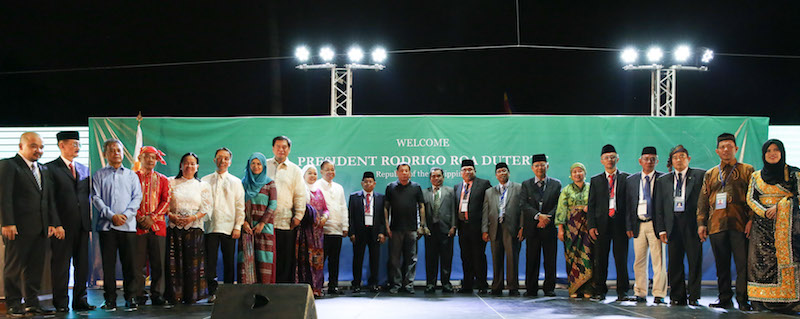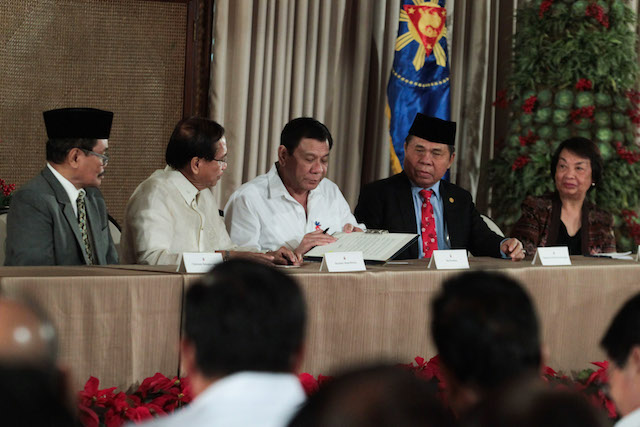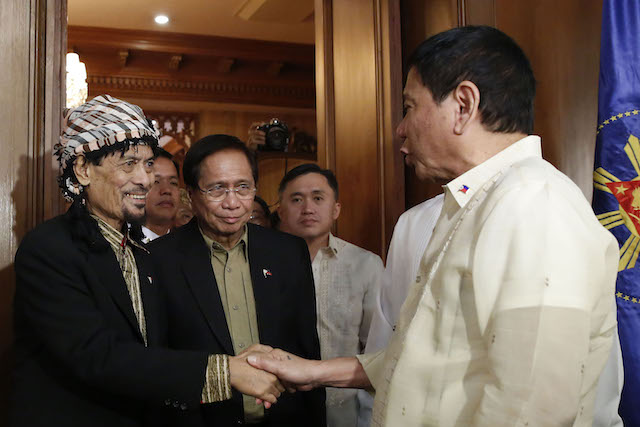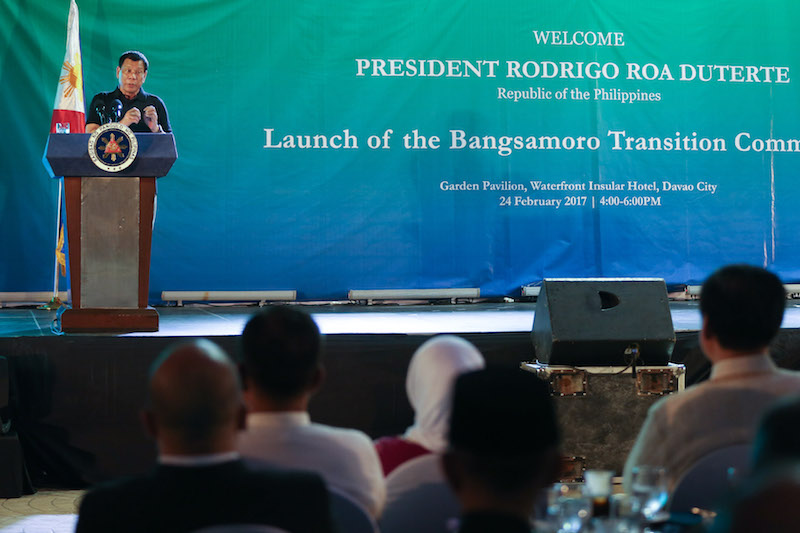DAVAO CITY (MindaNews / 12 March) — President Rodrigo Duterte will study the draft Bangsamoro Basic Law (BBL) when the Bangsamoro Transition Commission (BTC) submits it and will “pray that it would sail on still waters” once it reaches Congress.
Duterte, however, told the crowd at the inauguration of the People’s Television (PTV) Cordillera Hub in Baguio City on Saturday afternoon that he expects a “more or less vigorous opposition” at the Senate. “That’s expected. This is a democracy,” he said.
Duterte urged everyone, including those who oppose government, to use the Peoples Television to air their grievances and concerns. “Lahat na yung ayaw ng gobyerno, rather than really fight, the MI (MILF or Moro Islamic Liberation Front), you’re about to complete the Bangsamoro Transition draft, I will study it before we submit it to Congress and pray that it would sail on still waters.”
 The 21 members of the Bangsamoro Transition Commission (BTC) with President Rodrigo Duterte (center) at the launch on 24 February 2017 at the Garden Pavilion of the Waterfront Insular Hotel. TOTO Lozano / Presidential Photo
The 21 members of the Bangsamoro Transition Commission (BTC) with President Rodrigo Duterte (center) at the launch on 24 February 2017 at the Garden Pavilion of the Waterfront Insular Hotel. TOTO Lozano / Presidential Photo
The BTC, however, is not “about to complete” the draft Bangsamoro law. In fact, it has yet to begin drafting, because its 21 members were named only in February, three months after the Executive Order reconstituting the BTC was signed by the President.
At the launch of the BTC in Davao City on February 24, the President addressed the commissioners to “navigate the hindrances and obstructions” and find a way to peace.
The BTC held its first plenary session in Cotabato City on March 6 and 7 to craft their Internal Rules and come up with their work plan and budget. The body will continue discussing these on April 3 to 6 also in Cotabato City, in what BTC chair Ghazali Jaafar says would be a “marathon session.”
Jaafar told MindaNews in a telephone interview on Sunday that they created an ad hoc committee of five to revisit the internal rules of the previous BTC but adopted the old rules as their interim internal rules.
He said they hope to finalize their internal rules by April 3, set up the committees and decide on the working draft they would use in crafting the BBL.
“Work double time”
The BTC chair, concurrent 1st Vice Chair of the MILF, said he prefers the “agreed version” or the version agreed upon by the BTC and the Office of the President and submitted to Congress on September 10, 2014 but acknowledged this will still be discussed on the floor.
Jaafar said they will “try our best” to finish the draft by May 18, as suggested by some commissioners, to allow enough time for Duterte to study the draft.
Under the Bangsamoro Peace and Development Roadmap of the Duterte administration, the target for submission of the draft BBL to Congress is before the President delivers his second State of the Nation Address (SONA) on July 24.
Senate President Aquilino Pimentel III recently told MindaNews that the BTC “should now start working” and work “double time” to submit their draft to Congress by July, adding that passing a “bill into law is easier than (shifting from) old Constitution to new Constitution.”
Pimentel said the Senate will “accommodate and cooperate” with the Executive Branch’s two-track approach to peace through the Bangsamoro law and Federalism even as he admits the two-track process “introduces some complications” and that “the simplest would be straight to federalism.” The shift to federalism requires amending the 1987 Constitution.
 President Rodrigo Roa Duterte signs the Executive Order reconstituting the Bangsamoro Transition Commission in Malacañan on November 7, 2016. Also in the photo are Moro Islamic Liberation Front (MILF) Peace Implementing Panel chair Mohagher Iqbal, Presidential Peace Adviser Jesus Dureza, MILF Chair Al Haj Murad Ebrahim, and Government of the Philippines (GPH) Peace Implementing Panel chair Irene Santiago. KING RODRIGUEZ/Presidential Photo
President Rodrigo Roa Duterte signs the Executive Order reconstituting the Bangsamoro Transition Commission in Malacañan on November 7, 2016. Also in the photo are Moro Islamic Liberation Front (MILF) Peace Implementing Panel chair Mohagher Iqbal, Presidential Peace Adviser Jesus Dureza, MILF Chair Al Haj Murad Ebrahim, and Government of the Philippines (GPH) Peace Implementing Panel chair Irene Santiago. KING RODRIGUEZ/Presidential Photo
Under the 2012 Framework Agreement on the Bangsamoro (FAB) and the 2014 Comprehensive Agreement on the Bangsamoro (CAB) signed by the government (GPH) and MILF, the parties tasked the BTC to draft the BBL to pave the way for the creation of the new autonomous political entity called the Bangsamoro, that would replace the Autonomous Region in Muslim Mindanao (ARMM).
Jaafar said they expect President Duterte to certify the bill as urgent. The FAB provides that the draft BBL submitted by the Transition Commission “shall be certified as an urgent bill by the President.”
Under the Aquino administration, Congress adjourned in February 2016 without passing the BBL. Aquino did not certify the bill as urgent.
Expanded, more inclusive
Presidential Adviser on the Peace Process Jesus Dureza pushed for an expanded BTC membership from 15 to 21, to make it “more inclusive” and allow for participation of the Moro National Liberation Front (MNLF) so that the draft BBL that would be submitted to Congress will “converge” or “harmonize” the provisions of the MILF’s FAB/CAB and the remaining unimplemented provisions of the MNLF’s Final Peace Agreement (FPA).
The MILF nominated 11 members to the BTC while the GPH nominated 10, three of them representing the MNLF faction headed by Muslimin Sema (now chaired by Yusoph Jikiri).
 President Rodrigo Duterte welcomes Moro National Liberation Front (MNLF) founding chair Nur Misuari in Malacañang on November 3, 2016. Presidential Adviser on the Peace Process Jesus Dureza (center) fetched Misuari from Sulu to meet the President. RICHARD MADELO/ Presidential Photo
President Rodrigo Duterte welcomes Moro National Liberation Front (MNLF) founding chair Nur Misuari in Malacañang on November 3, 2016. Presidential Adviser on the Peace Process Jesus Dureza (center) fetched Misuari from Sulu to meet the President. RICHARD MADELO/ Presidential Photo
But the MNLF faction under founding chair Nur Misuari of Sulu, declined inclusion in the BTC, Misuari maintaining the MNLF has its own peace agreement to implement and alleging that the MILF and the other MNLF factions are “traitors.”
Dureza offered a separate peace implementing panel for the MNLF-Misuari faction. The MNLF side is chaired by lawyer Randolph Parcasio, former Executive Secretary to then ARMM Governor Misuari, while the government panel chair is Peace Process Undersecretary Nabil Tan, who was a member of the government peace panel negotiating with the MNLF in 1992-1996 and a member of the Tripartite Review that monitored the implementation of the 1996 Final Peace Agreement.
The panels have yet to hold their first formal meet although they have met twice, informally.
The undivided MNLF was set up in 1968 following the March 18 Jabidah Massacre and was chaired by Misuari, a professor at the University of the Philippines. It signed with the Philippine government the Tripoli Agreement of 1976 but the MNLF claimed it was not implemented in letter and spirit, and that President Ferdinand Marcos, using his martial law powers, created two autonomous regions instead of one
From Marcos to Duterte
The failure of the peace agreement led to a split in the MNLF, with vice chair Salamat Hashim of Maguindanao breaking away to form what was initially referred to as the “New MNLF” but later renamed Moro Islamic Liberation Front. Another faction, the MNLF Reformist Group was set up by Dimas Pundato of Lanao del Sur.
In the post-Marcos era, the Aquino administration restarted talks with the MNLF, the President herself, Corazon Aquino, meeting with Misuari in Sulu in September 1986. But no peace agreement was reached. Instead, the Aquino administration pushed for provisions in the 1987 Constitution for the creation of autonomous regions in Muslim Mindanao and the Cordilleras. The MNLF and MILF campaigned against the ratification of the Constitution in 1987 and in the 1989 plebiscite, campaigned against RA 6734, the Organic Act creating the ARMM.
Duterte in his Baguio speech on Saturday, mentioned Misuari and the MNLF after talking about the MILF.
He said Misuari “has many gripes with this government and the Republic. I understand that,” Duterte said. Misuari and Duterte met behind closed doors on February23, a day before the BTC launch. No details of the meeting were released.
 President Rodrigo Roa Duterte urges the members of the Bangsamoro Transition Commission (BTC) to exhaust all efforts in attaining just and lasting peace in Mindanao in his speech during the launch of the BTC at the Waterfront Insular Hotel in Davao City on February 24, 2017. SIMEON CELI JR./Presidential Photo
President Rodrigo Roa Duterte urges the members of the Bangsamoro Transition Commission (BTC) to exhaust all efforts in attaining just and lasting peace in Mindanao in his speech during the launch of the BTC at the Waterfront Insular Hotel in Davao City on February 24, 2017. SIMEON CELI JR./Presidential Photo
Duterete said Misuari can also use the People’s Television “to explain to the people so that … we have a balanced reporting and a fair share of what’s going on on the other fronts.”
“We’re fighting with the communists MI, MN,” Duterte said. The government, however, is on the implementation phase of the signed peace agreements with the MILF and MNLF and while Duterte was speaking Saturday afternoon in Baguio, his peace adviser and peace panel chair were busy in Utrecht, The Netherlands for backchannel talks with the National Democratic Front (NDF) that ended with both parties agreeing to resume the peace talks, restore the unilateral ceasefire and work for a bilateral ceasefire.
Duterte, the 16th Philippine President and the first Mindanawon to lead the nation, is the 7th President since Marcos to attempt to solve the half-a-century conflict with the Bangsamoro revolutionary fronts. He is the first President to have repeatedly vowed to address the historical injustices committed against the Bangsamoro. (Carolyn O. Arguillas / MindaNews)
